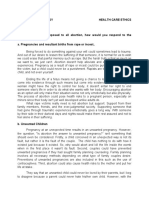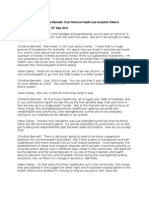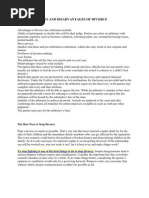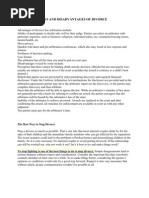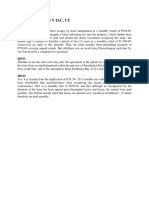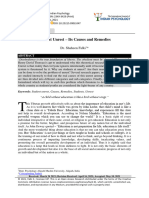Difference Between Issue and Problem
Difference Between Issue and Problem
Uploaded by
Pablo Jan Marc FilioCopyright:
Available Formats
Difference Between Issue and Problem
Difference Between Issue and Problem
Uploaded by
Pablo Jan Marc FilioOriginal Description:
Copyright
Available Formats
Share this document
Did you find this document useful?
Is this content inappropriate?
Copyright:
Available Formats
Difference Between Issue and Problem
Difference Between Issue and Problem
Uploaded by
Pablo Jan Marc FilioCopyright:
Available Formats
Difference Between Issue and Problem
Issue vs Problem
What strokes the most prominent difference between issue and problem is the solution. When
you have an issue, you generally can readily come up with the solution. Often, you even know
how you would solve an issue before it even presents itself. A problem, on the other hand, is not
something that you can solve without forethought, and even a certain amount of guesswork.
Size often dictates the difference between an issue and a problem. An issue is smaller, not life
altering, and it doesn’t present such a degree of difficulty that you have to seek out the counsel of
others in order to figure out the impact of the issue. A problem is larger in scale, often large
enough to alter your life either temporarily or permanently. A problem can easily require the
advice and guidance of those around you, in order to solve it.
An issue is a factor that might cause you some annoyance. A problem can impact people and
situations around you, even if they are not directly related to the problem. For instance,
forgetting your lunch is an issue, but losing your job is a problem.
On a corporate or governmental level, an issue is something that can be handled behind closed
doors, impacting no one but the people of highest authority in the situation. A problem involves
information that must be released, because there will be cause to involve employees, or citizens,
in the solution to the problem.
An issue also holds potential. When you discover that there is great potential for a situation to
have a large impact, it is still, by definition, an issue. The issue mutates into a problem when the
potential is realized. For instance, when a restaurant chef realizes that part of the batch of fish
they are serving for the night has gone bad, they have an issue, because it holds the potential to
make a lot of people sick, cause people to sue, and ruin the establishment’s reputation. If no one
has eaten, or has had a bad reaction to the fish, then it remains an issue. Once someone becomes
ill and accusations start to surface, the issue is now a problem.
Summary:
1. An issue has a readily recognizable solution.
2. Problems are life altering, temporarily or permanently.
3. Issues bear only a slight impact.
4. Issues cause personal annoyance.
5. Problems cause others to be affected.
6. Issues can be handled privately.
7. Problems must be handled openly, in order to resolve them in government or business
capacities.
8. An issue may have the potential to cause harm.
9. A problem develops when the harm or impact begins to surface.
Reasons why RH bill must not become a law
John Paul Atienza October 28 at 7:45pm
To: Congress of the Philippines.
We strongly oppose the passage of the Reproductive Health Bill (HB5043 for
the following reasons:
1. AS EMPLOYERS, we do not want to be compelled to provide free reproductive health care
services, supplies, devices and surgical procedures (including vasectomy and ligation) to our
employees, and be subjected to both imprisonment and/or a fine, for every time that we fail
to comply. (Section 17 states that employers shall provide for free delivery of reproductive
health care services, supplies and devices to all workers more particularly women workers.
(Definition of Reproductive Health and Rights Section 4, paragraph g, Section 21, Paragraph c
and Section 22 on Penalties)
2. AS HEALTH CARE SERVICE PROVIDERS, we do not want to be subjected to imprisonment
and/or a fine, if we fail to provide reproductive health care services such as giving information
on family planning methods and providing services like ligation and vasectomy, regardless of
the patient's civil status, gender, religion or age (Section 21 on Prohibited Acts, Letter a,
Paragraphs 1 to 5 and Section 22 on Penalties)
3. AS SPOUSES, we do not agree that our husband or wife can undergo a ligation or
vasectomy without our consent or knowledge. (Section 21 on Prohibited Acts, Letter a,
Paragraph 2)
4. AS PARENTS, we do not agree that children from age 10 to 17 should be taught their sexual
rights and the means to have a satisfying and "safe" sex life as part of their school curriculum.
(Section 12 on Reproductive Health Education and Section 4 Definition of Family Planning and
Productive Health, Paragraph b, c and d)
5. AS CITIZENS, we do not want to be subjected to imprisonment and/or pay a fine, for
expressing an opinion against any provision of this law, if such expression of opinion is
interpreted as constituting "malicious disinformation" (Section 21 on Prohibited Acts, Paragraph
f and Section 22 on Penalties)
6. We also oppose other provisions such as losing our parental authority over a minor child who
was raped and found pregnant (Section 21, a, no.3)
7. We also do not agree to the provision which reclassifies contraceptives as essential
medicines (Section 10) and appropriating limited government funds to reproductive services
instead of basic services (Section 23)
Thus, we urge you to immediately stop deliberations on the bill and stop wasting taxpayers
money.
You might also like
- Divorce Should Not Be Legalized in The PhilippinesDocument3 pagesDivorce Should Not Be Legalized in The Philippinesfrangkiepoop92% (48)
- Eleventh Edition: Managers and Management in Today's WorkplaceDocument35 pagesEleventh Edition: Managers and Management in Today's WorkplaceAhmed El KhateebNo ratings yet
- Reaction Paper RH LawDocument2 pagesReaction Paper RH LawChristine Gorospe89% (9)
- INFORMATION Serious Physical InjuryDocument1 pageINFORMATION Serious Physical InjuryPablo Jan Marc Filio100% (1)
- Meija V PamaranDocument3 pagesMeija V PamaranPablo Jan Marc FilioNo ratings yet
- Deed of Sale of Used VehicleDocument2 pagesDeed of Sale of Used VehiclePablo Jan Marc Filio100% (1)
- Petition of Habeas Corpus of The Custody of MinorDocument3 pagesPetition of Habeas Corpus of The Custody of MinorPablo Jan Marc FilioNo ratings yet
- Debate Grading RubricDocument1 pageDebate Grading RubricCharine GraceNo ratings yet
- 11 Tips On How To Pass The Board ExaminationDocument7 pages11 Tips On How To Pass The Board ExaminationKristine Ibarreta-JazulNo ratings yet
- Lecture 14 - Employee Relations, Engagement and TerminationDocument18 pagesLecture 14 - Employee Relations, Engagement and TerminationFaiza Sharif100% (1)
- Organization Process ApproachesDocument8 pagesOrganization Process Approachesarchangelkhel100% (1)
- BENEFICIALITY SPEECH Revised and CorrectedDocument5 pagesBENEFICIALITY SPEECH Revised and CorrectedElmo AdorNo ratings yet
- Manlutac PositionDocument3 pagesManlutac PositionJeriely Ortega QuinitaNo ratings yet
- 2 Moral DilemmaDocument5 pages2 Moral DilemmaAtasha Mae Santos TanacioNo ratings yet
- OppoDocument3 pagesOppoRodolfo TobiasNo ratings yet
- TOPIC II: Moral DilemmaDocument4 pagesTOPIC II: Moral DilemmaHaydee Christine SisonNo ratings yet
- Page 65-70Document4 pagesPage 65-70Wri AnNo ratings yet
- Thesis About RH BillDocument5 pagesThesis About RH Billafbteyrma100% (2)
- Assisted SuicideDocument4 pagesAssisted SuicideAmal B ChandranNo ratings yet
- RH LawDocument4 pagesRH LawLadychrisnhet UribeNo ratings yet
- Sample Thesis About RH BillDocument5 pagesSample Thesis About RH BillScott Faria100% (1)
- End of Life Assistance (Scotland) BillDocument5 pagesEnd of Life Assistance (Scotland) BillRonald KlinglerNo ratings yet
- How To Support Mental Health at WorkDocument44 pagesHow To Support Mental Health at Workbal_thakre100% (1)
- GE Elect 3 Module 13 14 MangiboaDocument8 pagesGE Elect 3 Module 13 14 MangiboaMary Loiesyl Camara Ubay-ubayNo ratings yet
- UNLOCKING YOUR CREDIT POTENTIAL: A REENTRY GUIDE TO BUILDING FINANCIAL STABILITYFrom EverandUNLOCKING YOUR CREDIT POTENTIAL: A REENTRY GUIDE TO BUILDING FINANCIAL STABILITYNo ratings yet
- Pre-Existing Condition - Joel ValenciaDocument15 pagesPre-Existing Condition - Joel ValenciaJoel D ValenciaNo ratings yet
- Thesis Sa RH BillDocument8 pagesThesis Sa RH Billmaggieturnerdesmoines100% (2)
- BioethicsDocument3 pagesBioethicsJaune SayNo ratings yet
- Essay #1Document1 pageEssay #1Jackson PradaNo ratings yet
- Module 4, Assignment 2Document7 pagesModule 4, Assignment 2Saba MushtaqNo ratings yet
- Question 1Document3 pagesQuestion 1laven.5813No ratings yet
- EssaysDocument8 pagesEssaysDilini RajakarunaNo ratings yet
- Children and Consent To Medical TreatmentDocument18 pagesChildren and Consent To Medical Treatmentesther kwanNo ratings yet
- Impromptu SpeakingDocument6 pagesImpromptu SpeakingTrần Ngọc LamNo ratings yet
- Name: Huma Purkit DATE: 27/08/2020 PI NUMBER: L1449334: Question No.1Document8 pagesName: Huma Purkit DATE: 27/08/2020 PI NUMBER: L1449334: Question No.1Hamzah PurkitNo ratings yet
- Peer Support Services Progressive Illness FactsheetDocument8 pagesPeer Support Services Progressive Illness FactsheetAngela IramNo ratings yet
- Understanding Culture, Society, and Politics (Q4W4)Document4 pagesUnderstanding Culture, Society, and Politics (Q4W4)SHEEN ALUBANo ratings yet
- IELTS Cause-Problem and Effect-Solution Model EssayDocument17 pagesIELTS Cause-Problem and Effect-Solution Model EssaySayaf RashadNo ratings yet
- Exam PaperDocument28 pagesExam PapershivrajhansrajNo ratings yet
- GENDERDocument4 pagesGENDERjanc adlNo ratings yet
- AbortionDocument7 pagesAbortiondanial bagheriNo ratings yet
- Musonda's AssignmentDocument13 pagesMusonda's AssignmentCanmind PhiryNo ratings yet
- LMLS RPDocument24 pagesLMLS RPPathway LawNo ratings yet
- RH Bill Term Paper TagalogDocument4 pagesRH Bill Term Paper Tagalogafdtfgkbv100% (1)
- Assignment On AbortionDocument4 pagesAssignment On AbortionChristine Joy MolinaNo ratings yet
- RH Bill Thesis ExampleDocument5 pagesRH Bill Thesis Exampledwt5trfn100% (2)
- RH BILL Finally ComesDocument1 pageRH BILL Finally ComesMichael TuazonNo ratings yet
- Diversity in Organizations FinalDocument6 pagesDiversity in Organizations Finalapi-741820889No ratings yet
- Report of Social Impact On DivorceDocument39 pagesReport of Social Impact On DivorceaburayhanNo ratings yet
- R & C of Sexual Activity: Lesson 6, Analysis of Recent Developments in Repro HealthDocument3 pagesR & C of Sexual Activity: Lesson 6, Analysis of Recent Developments in Repro HealthLinseyMunozNo ratings yet
- Purcom - DivorceDocument11 pagesPurcom - DivorceFelix MaraasinNo ratings yet
- Bennett May 10Document4 pagesBennett May 10api-25945645No ratings yet
- Health Management, Ethics and Research - Principles of Healthcare EthicsDocument7 pagesHealth Management, Ethics and Research - Principles of Healthcare EthicsJvMascarinasNo ratings yet
- Unwanted PregnanciesDocument3 pagesUnwanted PregnanciesElmeraine EstrellaNo ratings yet
- Grounds For Divorce: DefendantDocument4 pagesGrounds For Divorce: DefendantRaphael OngNo ratings yet
- The Advantages and Disadvantages of Divorce ArbitrationDocument18 pagesThe Advantages and Disadvantages of Divorce ArbitrationJeal Zapico Baricuatro89% (9)
- The Advantages and Disadvantages of Divorce ArbitrationDocument14 pagesThe Advantages and Disadvantages of Divorce ArbitrationJeal Zapico BaricuatroNo ratings yet
- Running Head: GROUP PROJECT 1Document12 pagesRunning Head: GROUP PROJECT 1Christopher LaneNo ratings yet
- Extemporaneous 2Document5 pagesExtemporaneous 2jhuhuNo ratings yet
- Thesis Statement Examples On Birth ControlDocument7 pagesThesis Statement Examples On Birth Controljessicaroblestucson100% (1)
- Negligence of DutyDocument8 pagesNegligence of DutyChristopher LaneNo ratings yet
- Dpo Requirements by CountryDocument11 pagesDpo Requirements by CountryPablo Jan Marc FilioNo ratings yet
- PLTDT V City of DavaoDocument2 pagesPLTDT V City of DavaoPablo Jan Marc FilioNo ratings yet
- Lopez V. People G.R. NO. 188653 JANUARY 29, 2014Document3 pagesLopez V. People G.R. NO. 188653 JANUARY 29, 2014Pablo Jan Marc FilioNo ratings yet
- My Music Hit ListsDocument11 pagesMy Music Hit ListsPablo Jan Marc FilioNo ratings yet
- Dimaculangan V Iac, Uy: FactsDocument1 pageDimaculangan V Iac, Uy: FactsPablo Jan Marc FilioNo ratings yet
- DanceDocument3 pagesDancePablo Jan Marc FilioNo ratings yet
- Cayetano V Patricia TiongsonDocument2 pagesCayetano V Patricia TiongsonPablo Jan Marc Filio100% (2)
- Sample Statistics 1Document2 pagesSample Statistics 1Pablo Jan Marc FilioNo ratings yet
- Humanities SyllabusDocument3 pagesHumanities SyllabusPablo Jan Marc FilioNo ratings yet
- Garcia V LacuestaDocument2 pagesGarcia V LacuestaPablo Jan Marc Filio100% (1)
- Case Digest Civ2 - BarolaDocument90 pagesCase Digest Civ2 - BarolaPablo Jan Marc FilioNo ratings yet
- Sebastian V PanganibanDocument2 pagesSebastian V PanganibanPablo Jan Marc FilioNo ratings yet
- Air Philippine Corp V Pennswell IncDocument1 pageAir Philippine Corp V Pennswell IncPablo Jan Marc FilioNo ratings yet
- People V JohnsonDocument4 pagesPeople V JohnsonPablo Jan Marc FilioNo ratings yet
- BPI V ALS Management & Development CorpDocument2 pagesBPI V ALS Management & Development CorpPablo Jan Marc FilioNo ratings yet
- Bautista V BautistaDocument4 pagesBautista V BautistaPablo Jan Marc FilioNo ratings yet
- Civil Law (And Practical Exercises) 2022 Bar SyllabusDocument30 pagesCivil Law (And Practical Exercises) 2022 Bar SyllabusGabrielle Ann SeguiranNo ratings yet
- Planned Parenthood of Central Mo. v. Danforth, 428 U.S. 52 (1976)Document38 pagesPlanned Parenthood of Central Mo. v. Danforth, 428 U.S. 52 (1976)Scribd Government DocsNo ratings yet
- Justified Love: An Argumentative Essay On DivorceDocument3 pagesJustified Love: An Argumentative Essay On DivorceCOFFEE BOMBNo ratings yet
- Sabalones Vs CADocument1 pageSabalones Vs CAMerriam Racho Alvar100% (3)
- War Is OverDocument1 pageWar Is OverMiaNo ratings yet
- Sadie & MaudDocument27 pagesSadie & MaudHannan NurNo ratings yet
- Civil Law Bar Exam Answers - Succession - 2015Document20 pagesCivil Law Bar Exam Answers - Succession - 2015Renalyn ParasNo ratings yet
- The Spanish Royal FamilyDocument5 pagesThe Spanish Royal FamilyMa'at MutamuntatNo ratings yet
- LLB Previous Years Solved Question Papers - Family Law I (Hindu Law) - LLB 2nd Semester Examination - 2016 - Old Question PaperDocument2 pagesLLB Previous Years Solved Question Papers - Family Law I (Hindu Law) - LLB 2nd Semester Examination - 2016 - Old Question Papercocak24144No ratings yet
- SEGAK 2024 PRA (AutoRecovered)Document22 pagesSEGAK 2024 PRA (AutoRecovered)NURUL AKMAL BINTI ZULZAIMI MoeNo ratings yet
- Senarai Nama Peserta Perkhemahan SKPD 2024 - NewDocument10 pagesSenarai Nama Peserta Perkhemahan SKPD 2024 - NewAhmad SyafiqNo ratings yet
- Simulasi Bahasa Inggris7 2021Document3 pagesSimulasi Bahasa Inggris7 2021Pratika Ratri SandiNo ratings yet
- OW & ODSP Rates and The Ontario Child Benefit: As of September 30, 2017Document2 pagesOW & ODSP Rates and The Ontario Child Benefit: As of September 30, 2017Peter IveyNo ratings yet
- STING - Shape of My HeartDocument3 pagesSTING - Shape of My HeartAngel Carhuallanqui ÑahuiNo ratings yet
- Amcat Training and Placement Papers - Amcat Previous Questions (Papers) - 10 PDFDocument4 pagesAmcat Training and Placement Papers - Amcat Previous Questions (Papers) - 10 PDFAlokNo ratings yet
- Evangerina Kokushubira Elizeus Vs Revina Anatory (Civil Appeal 16 of 2021) 2022 TZHC 2958 (13 April 2022)Document20 pagesEvangerina Kokushubira Elizeus Vs Revina Anatory (Civil Appeal 16 of 2021) 2022 TZHC 2958 (13 April 2022)Hossea MangulaNo ratings yet
- Giacomo MeyerbeerDocument7 pagesGiacomo Meyerbeerapi-285186901No ratings yet
- Sing To The DawnDocument22 pagesSing To The DawnNor KasimNo ratings yet
- Trends in Divorce in IndiaDocument1 pageTrends in Divorce in Indiamadhuri_trivedi04No ratings yet
- Boy ExamDocument4 pagesBoy Examapi-337997995100% (1)
- Student Unrest - Its Causes and Remedies: Dr. Shaheen FalkiDocument28 pagesStudent Unrest - Its Causes and Remedies: Dr. Shaheen Falkipayelgulu2005No ratings yet
- Development Team: Paper No.: 02 Social Cultural Anthropology Module: 09 Approaches To The Study of FamilyDocument13 pagesDevelopment Team: Paper No.: 02 Social Cultural Anthropology Module: 09 Approaches To The Study of FamilyBanu SreeNo ratings yet
- Jewish Standard Guide To Jewish Life 2017Document152 pagesJewish Standard Guide To Jewish Life 2017New Jersey Jewish StandardNo ratings yet
- Sexual Harassement Domestic Violence Arab Citizens Public Opinion 2019Document42 pagesSexual Harassement Domestic Violence Arab Citizens Public Opinion 2019zeineb.guehissNo ratings yet
- 2019-12-31 Tier 25 Register of Sponsors PDFDocument2,028 pages2019-12-31 Tier 25 Register of Sponsors PDFOjebola AyobamiNo ratings yet
- MediaReach OMD - Adetunji Adelekan and Adewole AdeosunDocument19 pagesMediaReach OMD - Adetunji Adelekan and Adewole AdeosunCHININo ratings yet
- Research Proposal: Alarming Increase of Divorce Rate and Its BenefitsDocument3 pagesResearch Proposal: Alarming Increase of Divorce Rate and Its BenefitsAyesha RahmanNo ratings yet
- Family Law II NotesDocument24 pagesFamily Law II NotesMohitDiwan67% (3)
- MarriageDocument38 pagesMarriagedrkadiyala2No ratings yet
- The Joys of Parenthood by SimonDocument6 pagesThe Joys of Parenthood by SimonEylül KahveciNo ratings yet













































